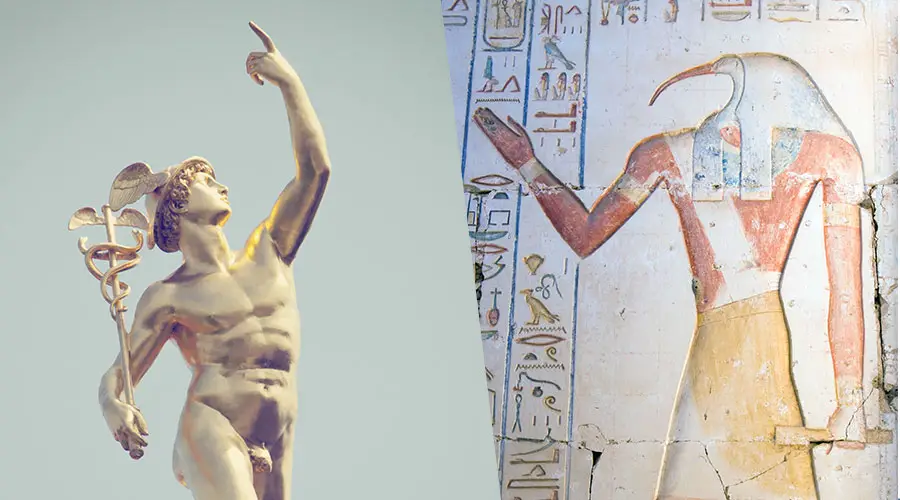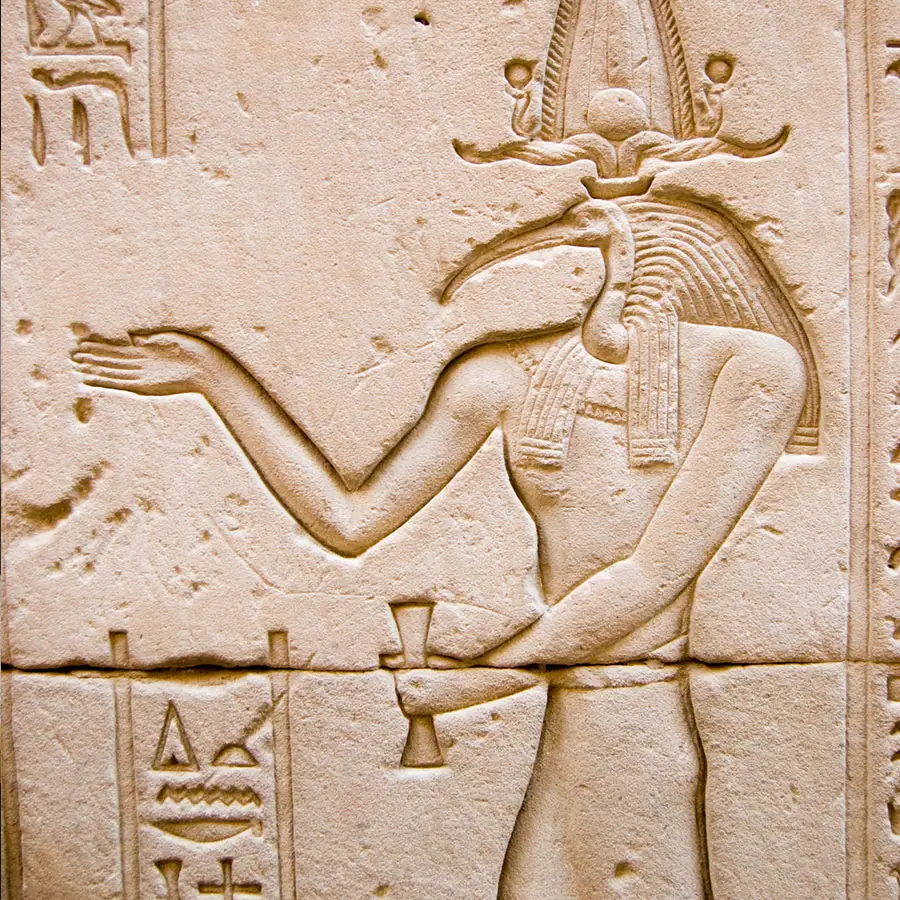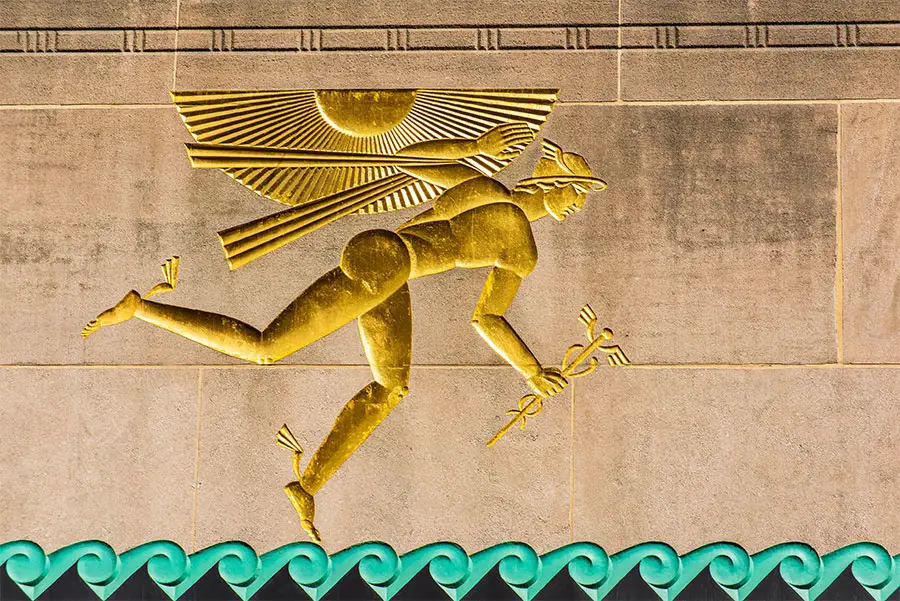Ever since ancient Egypt and Greece, when people gathered in temples to worship the gods, people have wondered if the Thoth and Hermes were the same deity.
The idea that the Egyptian god Thoth and the Greek god Hermes are the same deity first became popular in 500 BC, when the two cultures started mixing. Later the name Hermes Trismegistus was created to refer to both deities as one, and he is considered the creator of the system of philosophy known as Hermeticism.
Some believe that Thoth taught the Egyptian priests how to read and write, as well as esoteric knowledge of the universe. He then returned and helped create the ancient Greek civilization by teaching Pythagorus. His origins can be traced back to the lost civilization of Atlantis.

The Origins of Thoth and Hermes
The idea that Thoth and Hermes are the same immortal being is popular amongst the New Age movement. According to Drunvalo Melchizedek, a spiritual teacher who lives in Sedona, Arizona, the origins of Thoth go back to Atlantis. 52 000 years ago, he figured out how to continue living in the same body without dying, and continued to live until 1991 when he left our world. He was even the king of Atlantis for 16 000 years, and was known as Chiquetet Arlich Vomalites.
Thoth
After the destruction of Atlantis, Chiquetet Arlich Vomalites and other Atlanteans had to wait 6000 years before they could begin building a new civilization. Eventually they created the ancient Egyptian civilization, and he introduced himself to this new culture as Thoth.
Thoth is the Greek name for this deity, in Egyptian he is known as Djhuty. He is the god of the moon, reckoning, and learning. He was regarded as the inventor of languages and writing, and the patron to scribes, as well as the representative of the sun god, Re. During ancient Egypt, Thoth spent most of his time writing down everything that took place, and he was known as the Scribe.
Over time the Egyptian civilization declined. Researchers often wonder why the structures from the early parts of ancient Egypt are so much better built, and withstand the stresses of time so much better than the pyramids and temples of later Egypt. It is because the civilization was created from the beginning with existing technology from the previous civilization of Atlantis. Gradually this knowledge and expertise was lost. Eventually it became time to create a new civilization, and Thoth went on to create ancient Greece, renaming himself Hermes.
In Egypt, Thoth was portrayed as having the body of a man, and the head of an ibis bird. He holds an ankh, the Egyptian symbol for eternal life, and a papyrus scroll, as he is the inventor of language and writing. You can read about why he had an ibis head by clicking here.

Hermes
During ancient Greece, Hermes was considered the son of Zeus. His cult following was located in Arcadia, and he was worshipped as the god of fertility, as well as the protector of cattle and sheep. In the Odyssey, he is the messenger of the gods.
In Greece, Hermes was portrayed as bearded man, wearing a tunic and cap, with wings on his boots. He holds a caduceus, a winged staff with two snakes intertwining and copulating. You can read more about Hermes and his caduceus staff by clicking here.

Differences between Thoth and Hermes
One of the criticisms of the idea that Thoth and Hermes are the same immortal being is that the two gods seem to be very different from one and other. They are both associated with language and magic, but other than that seem to be totally different deities.
Hermes is a trickster, he is chaotic and at times deceptive. Thoth on the other hand is quiet and conducts himself like a librarian. Hermes is associated with travel and commerce, while Thoth records judgements on the souls of the deceased.
The Greek’s interpretation of ancient Egypt
Already by ancient Greece people were starting to think of Hermes and the Egyptian god Thoth as being the same. There was a period of time when the two ancient civilizations both existed, and some cultural exchanges took place amongst the people of the two societies, as well as the deities who helped them flourish. This period of cultural fusion began with the invasion of Alexander the Great into Egypt in 331 BC.
However, the idea that they are the same god can be traced back to at least 500 BC. The Greeks also made other connections between their gods and the Egyptian ones. For example, they believed that Amun-Ra was the Egyptian version of their Zeus. Their system of figuring out which of their gods matched which Egyptian gods was called Interpretatio graeca.
The Greeks started worshipping who they considered to be both Hermes and Thoth in the Temple of Thoth in Khemnu, which they called Hermopolis.
Hermes Trismegistus and Hermeticism
Eventually a new name was developed, that was in reference to both Thoth and Hermes, as he became Hermes Trismegistus, which means “Hermes Thrice-Greatest”. This came about later, in the first to third century AD, in the Ptolemaic and Roman periods, in which a Greco-Egyptian culture existed. It is during this time that the writing attributed to Hermes Trismegistus emerge, including the Emerald Tablet and the Corpus Hermeticum, where esoteric knowledge of the universe was recorded.
Thoth is married to Shesat
Throughout his various experiences teaching humans and helping civilizations be built, Thoth has been accompanied by his wife Shesat. She is also an advanced being, a divine scribe and the goddess of reading, writing and arithmetic. She is the female aspect of Thoth. At the time of this writing, it is unknown what her name was during Greece, but according to Drunvalo, she left our world along with Thoth in 1991.
Recommended Reading
If you want to continue exploring this subject more deeply, you can see which books I recommend by clicking here.

